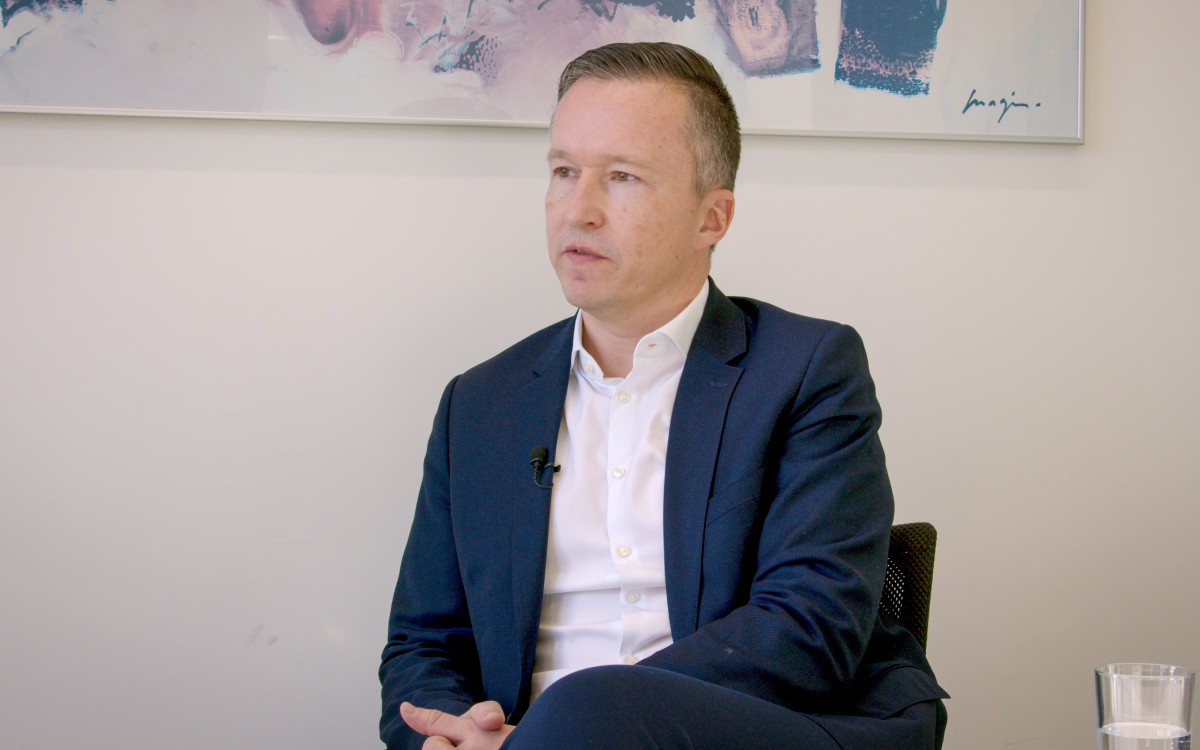Sustainable finance rules set to fully enter real economy in 2025 – finance industry initiative

CLEW: With Olaf Scholz, Germany has had a chancellor for the past three years who previously acted as finance minister and under whose aegis the country adopted its first sustainable finance strategy. Yet, given that sustainable investments played only a very marginal role in public debates during his coalition government’s term, we are left to ask: what has happened in the sector during Scholz’s time in office?
Matthias Hübner: A lot of things have happened during this time. Most importantly, I’d say that the majority of financial institutions and companies from the real economy have really started to burrow into the topic. Most have left the theoretical stage and started to work on implementation.
Across Europe, there has been a wave of new regulation and initiatives in the past years that have, or soon will, come into effect. This includes the EU taxonomy that provides a classification of sustainable investment activities, the Corporate Sustainable Reporting Directive (CSRD) that compels companies to provide adequate data, or the Corporate Sustainability Due Diligence Directive (CSDDD) that is meant to ensure environmental and social standards in supply chains.
However, it’s true that the topic has to some extent taken a back seat in public debates compared to 2021. I would argue that this is due to a certain habituation effect, meaning that sustainable finance is no longer a novelty that people are curious about. After going through a first ‘reality check’, some may grow tired of the topic, especially when it comes to often long and complicated implementation procedures.
Did the sequence of crises, from the pandemic to energy prices, Russia’s invasion of Ukraine, and the rise of populist politics, harm the adoption of sustainable finance principles in the past years?
The surrounding political conditions have been challenging in the past couple of years and you can see that there is some backlash against the topic, although this is even more the case internationally than for Germany. The re-election of Donald Trump as U.S. president, for example, has been perceived as a setback after the Republican candidate openly criticised the ESG (environmental, social, governance) principles for sustainable finance activities, even though it remains unclear at this point what the exact consequences will be.
In any case, I think very few people believe that the topic will really lose importance despite public backlashes. Sustainable finance and its motivations, including climate action or biodiversity protection, rely on international coordination and cooperation to be effective – and companies, as well as banks, know this.
But it appears increasingly difficult to achieve breakthroughs in international diplomacy, for example at the UN climate change conference COP. Private companies and industry initiatives can compensate for this to some extent, but they need clear targets and guidelines set by the states to really stay on track. A case in point is emissions trading, which is largely voluntary and comes with a lot of opaque and patchy data. It remains a challenge to establish internationally acknowledged standards that mark out the pitch.
What kind of activities has the Sustainable Finance Cluster Germany (GSFC) focused on in the past, and what are its plans to strengthen progress in sustainable finance in the country?
We will remain the platform for all stakeholders involved in sustainable finance in Germany. This, of course, includes our members and sponsors from the financial industry but also policymakers, researchers or industry representatives from other sectors. Beyond our sustainable finance summit in Germany’s financial centre Frankfurt, we aim to push for more exchange between the financial industry and companies from the real economy.
Regarding our content focus, we have pushed for the Net Zero Banking Alliance Germany that aims to align financial portfolios with the goals of the Paris Agreement throughout 2024. In 2025, we aim to focus on transition plans and biodiversity. The cluster must act as a voice for sustainable finance in Germany and ensure that the topic is kept on the agenda to prepare the financial industry, but also the economy as a whole, for its transformation in this respect.
The EU taxonomy for sustainable finance has so far been one of the most visible policy projects in sustainable finance. The taxonomy regulation entered into force in 2020. Would you say that this has already had the groundbreaking effect on investors’ perception that some had hoped for?
I wouldn’t look at the taxonomy alone but always consider the package of European measures that it is embedded in. Banks, asset managers and other financial market actors have to deal with each one of them, including the CSRD, the CSDDD or the Sustainable Finance Disclosure Regulation (SFDR) to create greater transparency of sustainability aspects when offering financial products to customers.
Regarding the package’s standing among financial industry actors, I’d say there is no general rejection and most accept the general idea. Financial institutions themselves benefit from better data collection and processing, even if some of the rules might overshoot the mark and go too much into detail in areas of little relevance for sustainability. However, the way I interpret the industry’s debate is that there is a widespread desire to further adapt, harmonise and streamline sustainable finance rules rather than rescinding them.
What could this adaptation of regulation look like?
The main question financial market actors need answering through sustainable finance rules is ‘which investments will be future-proof and which won’t be?’. Many corporates complain that they need to provide too much data and they doubt whether this will really help banks or investors to assess an investment’s compatibility with sustainability targets. So, it’s about a cost-benefit analysis for financial institutions and the question of which data should be required.
Just like other companies in the economy, financial institutions seek legal and planning security. But the opposite is often the case, for example regarding the CSDDD’s implementation into German law, which has been hanging in the balance for quite some time. A quick adoption and clarity regarding interpretation is of the essence, especially if there is already an agreement at the EU level.
The expansion of the CSRD in 2025 and 2026 means that a much larger share of companies across Europe are covered by reporting duties on their exposure to sustainability as a prerequisite for being eligible for receiving bank loans. Do you think this will finally help create an obvious and unmissable link between sustainability policies, financial markets and the real economy?
Assuming all deadlines will remain in place as planned, I expect this will put the topic firmly on the agenda and give more clarity regarding market transparency. However, it will also create many new practical issues for financial market actors. How do they get the required data? Do they have to examine all companies individually? Or will there be central platforms for collecting and storing data? How to deal with time-delayed provision of data? These questions and more still need answering.
The German government at the end of last year told the EU Commission to postpone the expanded CSRD duties and exclude smaller companies from the reporting requirements, arguing that these are too ambitious for many businesses to comply. What would you say is the effect of such a last-minute intervention to slow down implementation?
This is yet another example for creating unnecessary uncertainty, which is harmful at a time when companies already deal with a lot of ambiguity. Two things need to be distinguished here: merely postponing long-agreed deadlines is not beneficial, not even for the companies that have to disclose data.
Most of Germany’s small and medium sized companies that form the ‘Mittelstand’ have subsidiaries in other EU countries, meaning they will at least to some extent be affected by the expanded CSRD in 2025 anyway. Another question concerns the effectiveness and efficiency of regulation. This discussion is worth having both for companies and for financial institutions. But mixing them will only add to confusion.
A recent survey by Germany’s state-owned development bank KfW found that many smaller companies are still very much uncertain about what to expect from sustainable finance regulation. Will a swift implementation even be possible if the companies that are affected are unaware of it?
I’m sure most companies will quickly respond once they are required to deliver the data, even if some are more prepared and eager to participate than others. But there certainly is a problem if companies have not yet fully realised what is about to happen to them. I’d argue that this is also because some people who are not as close to the topic only read the headlines in the press, which sometimes suggest that regulation has not yet been agreed, which it already has at EU level. Uncertainty is never appreciated and can lead to the misconception that there won’t be any regulation at all.
However, if you look at the current ‘omnibus’ debate in Brussels, this also adds to uncertainty. The EU Commission under Ursula von der Leyen has proposed to review the bloc’s entire sustainable finance package and possibly remove a large chunk to make it more palatable to financial market actors. The net impact of those changes might be beneficial but, if the taxonomy, the CSRD, and the CSDDD are all reopened and go through the various administrative stages in Brussels again, this might blur expectations and open the door for lobby groups to water down certain parts. So, as of today, you can’t really anticipate what the outcome will be.
Do you think the EU is well prepared for implementing its own set of rules or is it in for a bumpy ride once these are rolled out across the economy?
Ultimately, it is the companies and financial institutions who must make it happen. The companies need to provide the data that financial institutions can then process. As far as I can tell, there appears to be clear correlation between a company’s size and its preparedness for sustainable finance rules. Many companies are reasonably well prepared, both the large ones listed on the stock market and many medium-sized ones.
It certainly helps if a company is large enough to afford a dedicated compliance department for sustainable finance rules. Smaller ones may find it difficult to make a smooth start. However, a lot of the required data is often already available and has been raised in different accounting contexts. The challenge in many cases is to put available data together in a coherent report that systematically checks the boxes regarding sustainable finance criteria. I’d argue that it is very unlikely any company will have to start from scratch.
Beyond this technical readiness and the “ticking the box” exercise, there is always the question of whether the companies and financial institutions see a real benefit for themselves when complying with those rules. This is certainly an aspect that the EU, but also national policymakers and politicians, need to work on: explain the rationale even better and ensure you create a positive narrative around sustainable finance!
Germany is a country where the average citizen has relatively little concern for financial markets, as share ownership is not widespread and most people rely on state pensions as a retirement plan. Even if the coalition government’s collapse has pulled the plug on plans to roll out a new capital market-based pension to complement state pensions, do you think that this concept has the potential to mainstream sustainable finance as an idea among citizens?
Figures released by the German Shareowner Institute suggest that investing in shares is trending upwards in the country, even if the numbers are still not overwhelming. The pandemic and the increasingly easy access to exchange traded funds (ETFs) have certainly spurred this trend, as well as a growing uncertainty about the future level of state pensions.
The ‘boomer’ generation still benefits from guaranteed pension levels, but younger people often look for alternatives. Accessibility is a major factor here and the more that barriers are removed and uncomplicated access on digital platforms is available, the faster this will happen - and a state-backed incentive to invest is of course going to speed things up further.
This can clearly contribute to fostering sustainable finance in the mid- to long-term, but I really consider this a marathon rather than a sprint. Today already, there are people who seek sustainable investment schemes out of conviction, but they only amount to a small share of all investors. So we definitely have some room left for further growth.



